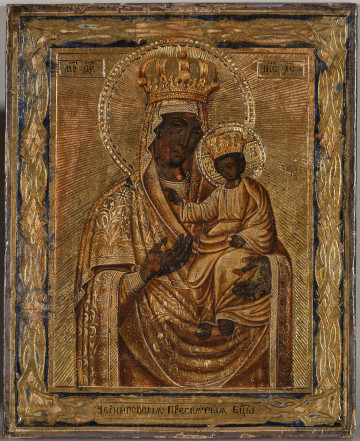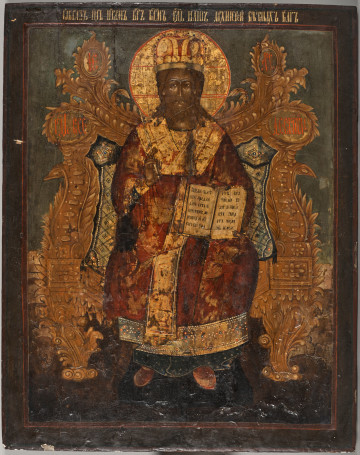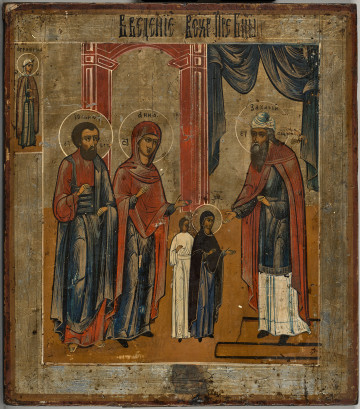
The Mother of God of Hodigitria
19th (?) century
Castle Museum in Łańcut
Part of the collection: Ikony
Theotokos Hodegetria Trojeručica (of the Three Hands), Russia, 19th c. The presented 19th-century icon is an example of a depiction of Hodegetria - see S.12677MŁ. The distinctive feature of this icon is the third hand appearing in the robes of the Mother of God, which gave it its name - the Three-Handed. The origin of this image goes back to the 8th c. when the Byzantine emperor Leo III introduced iconoclasm - the ban on the creation and worship of icons. St. John of the Syrian Damascus, the then official to the Islamic caliph, was a writer, theologian, and Christian philosopher, later declared a Church Father. He wrote treatises in defence of the cult of icons, which he then sent to the emperor. The enraged Leo III was powerless to punish the author of the texts, since John was a subject of the caliph and served in his court. In an act of revenge, the emperor devised a ruse and sent a fabricated letter, in which John was urging the emperor to seize the Syrian capital. The caliph believed the phony document and ordered John's right hand to be cut off at the wrist and publicly displayed. After some time, the saint reclaimed his severed hand, held it to the stump and, praying before the Theotokos icon, fell asleep. When he woke up, he saw the the wrist miraculously joined back with the hand. John, grateful to the Mother of God for the miraculous healing, had a silver votive offering be crafted in the shape of a hand, and he attached it to the icon. The saint resigned from the secular position he held until then and entered the Monastery of Saint Sabbas in the Judean Desert. The icon was gifted to the Serbian archbishop Sabbas in the 13th c. During the occupation of Serbia by the Turks in the 14th c., the painting was loaded onto a donkey, which carried it to the Hilandar Monastery on the Athos peninsula, where it remains to this day. In later copies of the icon, in place of the silver votive offering, the hand began to be painted on, which is described under S. 12878MŁ. Teresa Bagińska-Żurawska https://orcid.org/0000-0002-9243-3967
Other names
The Three-Handed Mother of God
Dimensions
height: 27 cm, width: 22 cm
Object type
Icons
Technique
gilding, tempera
Material
gold, tempera, wood
Origin / acquisition method
decyzja administracyjna
Creation time / dating
Creation / finding place
Owner
Castle Museum in Łańcut
Identification number
Location / status

19th (?) century
Castle Museum in Łańcut

1800 — 1850
Castle Museum in Łańcut

1800 — 1899
Castle Museum in Łańcut
DISCOVER this TOPIC
National Museum in Lublin
DISCOVER this PATH
Educational path